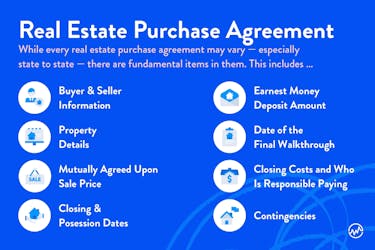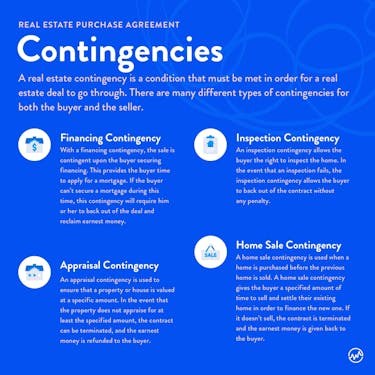
12 High-ROI Home Improvements
In This Article
- What Is A Purchase Agreement?
- What Is Included In The Real Estate Purchase Agreement?
- Do You Need A Real Estate Purchase Agreement?
- Language In A Real Estate Purchase Agreement
- Can A Real Estate Purchase Agreement Be Terminated?
- Real Estate Purchase Agreement Contingencies
- Purchase Agreement Templates
- Real Estate Purchase Agreement
- Continued Learning: Home Buying and Real Estate Investing
After you’ve found a home to buy, whether that’s to live in or use as an investment property, the paperwork begins. During this process, questions will arise such as: what’s the next step to close the sale? How can you keep track of all home buying details? And how can you protect yourself if an unexpected problem arises? The answer to all these questions is a real estate purchase agreement.
This is the topic of the 7-part online course “Real Estate Contracts: Mastering the Purchase and Sale Agreement, taught by Deslyn O’Dell, who has been investing in real estate for 15 years.

In this article, we’ll explain Deslyn’s talking points on the nuances of a real estate purchase agreement, including:
- What is included in the purchase agreement
- The language of the purchase agreement, and what specific terms mean
- Whether or not you can void a purchase agreement
- Free templates for you to utilize
- Additional home buying and real estate investing resources
Let’s start by defining what a purchase agreement is.
What Is A Purchase Agreement?

A purchase agreement outlines the terms of a real estate transaction. It is a legally binding document that specifies the purchase price and financing, earnest money deposit amount, the conditions under which the contract can be terminated, along with other important information about the purchase or sale of a house.
The buyer initially proposes the terms of the contract, and then the seller has three options:
- agree
- reject
- negotiate
You can utilize a real estate purchase agreement for the buying or selling of any type of residential property as long as the following two criteria are met:
- the home has either been previously owned
- construction will be finished prior to the closing date on the contract
Keep in mind that a purchase agreement may be referred to with different names, such as a “real estate sales contract” or “home purchase agreement”.
Also worth noting: a purchase agreement is not a bill of sale. A purchase agreement involves a future transaction and is signed before items are exchanged.
On the other hand, a bill of sale is a sign of transfer of ownership and is signed during or after the exchange of money and property. Plus, the bill of sale serves as the receipt.
What Is Included In The Real Estate Purchase Agreement?

While every real estate purchase agreement may vary — especially state to state — there are fundamental items in them. This includes:
- Buyer and seller information
- Property details
- Mutually agreed upon sale price
- Closing and possession dates
- Earnest money deposit amount
- Date of the final walk-through
- Closing costs and who is responsible for paying
- Contingencies
Do You Need A Real Estate Purchase Agreement?
You may be wondering if a real estate purchase agreement is necessary, whether it’s out of sheer curiosity or perhaps you're buying a house from a family member and you don’t want to deal with the extra paperwork.
The truth is that there can be severe repercussions if a purchase agreement is not used — for both the buyer and the seller. Some of these dangers include:
- Lawsuit
- Appearing in court to explain ownership of the home
- Complicating the transfer of the title
- Risk of penalties for an improper sale
- Buying or selling property that isn’t up to health code standards or safe
When buying or selling property, it’s vital to have a real estate purchase agreement.
Next, we’ll explore some terms in a real estate purchase agreement that can be confusing.
Language In A Real Estate Purchase Agreement
Understanding a few of the following complex terms in a real estate purchase agreement makes the process of creating a real estate purchase agreement easier.
Earnest Money
Earnest money is a deposit from a buyer to show his or her interest in purchasing a property. In order to write the purchase agreement, a deposit is required to hold the home.
If the contract goes through, the amount of earnest money deposited is credited to the agreed upon purchase price. On the other hand, if the sale does not go through, the money is returned to the potential buyer.
Settlement Date
Also known as the “closing”, the settlement day is when the sale becomes official, as negotiated between buyer and seller.
Escrow
If you haven’t heard of escrow before, it is a safe holding area — often a third party — where money or other important documents are held until the transaction is complete. It’s used to protect the home buyer and the seller during the buying and selling process.
Contingency
A contingency specifies a “condition or action” that must be met for a real estate contract to go through.
Can A Real Estate Purchase Agreement Be Terminated?
One question that often arises with a real estate purchase agreement is whether or not it can be voided. The short answer is yes, but it requires more explanation.
Buyers can terminate real estate contracts under certain conditions. Sellers have fewer opportunities to cancel, but in some situations may be allowed to keep the buyer deposits if purchase agreements are terminated without reason.
As a buyer, you typically provide an earnest money deposit when you make an offer on a home.
If you want to get out of a real estate contract without meeting the terms, you will risk losing your entire deposit.
If you want to terminate a real estate contract but don’t have any contingencies — which we’ll explore in the next section — you can breach the contract. But there are severe drawbacks. If you breach the contract, you are likely to lose the money you already spent on the following:
- an appraisal
- a home inspection
- a title survey
What’s more, the seller could sue you for breach of contract.
Next, we’ll explore the most common contingencies associated with a real estate purchase agreement.
Real Estate Purchase Agreement Contingencies

A real estate contingency is a condition that must be met in order for a real estate deal to go through.
There are many different types of contingencies for both the buyer and the seller.
Financing Contingency
With a financing contingency, the sale is contingent upon the buyer securing financing.
This provides the buyer time to apply for a mortgage because this clause usually stipulates a specified number of days the buyer is given to obtain the needed financing.
If the buyer can’t secure a mortgage during this time, this contingency will require him or her to back out of the deal and reclaim earnest money.
Inspection Contingency
Another common contingency is an inspection. An inspection contingency allows the buyer the right to inspect the home.
If a home inspection shows damage — such as water leaks, mold, or other structural or health hazards — the buyer can then negotiate the contract. A cost-of-repair contingency can be included, which provides a dollar amount for necessary repairs.
In the event that an inspection fails, the inspection contingency allows the buyer to back out of the contract without any penalty.
Here are a few tips with a home inspection:
- Be present during the inspection
- Make a list of things you want to be inspected
- Be aware of what’s not covered
- Take photographs and jot down notes
- Review the report thoroughly
Read more about home inspections and a free home inspection checklist right here.
Appraisal Contingency
An appraisal contingency stipulates that a home must appraise at a value equal to or higher than what the buyer agreed to pay.
An appraisal contingency is used to ensure that a property or house is valued at a specific amount. In the event that the property does not appraise for at least the specified amount, the contract can be terminated, and the earnest money is refunded to the buyer.
Home Sale Contingency
With the home sale contingency, the home purchase is contingent upon the buyer’s ability to sell their current home.
This is used when a home is purchased before the previous home is sold. A home sale contingency gives the buyer a specified amount of time to sell and settle their existing home in order to finance the new one. If it doesn’t sell, the contract is terminated and the earnest money is given back to the buyer.
Purchase Agreement Templates
Whether you are learning more about a purchase agreement to improve your home buying knowledge or you are looking to create one now, here is a free template that you can utilize.
Here are a few other templates:
Real Estate Purchase Agreement
Regardless of why you’re buying a home, ensure that you know every facet of the process and protect yourself — that means using a real estate purchase agreement.

If you’d like to learn more about the real estate purchase agreement, you can watch the 7-part online course “Real Estate Contracts: Mastering the Purchase and Sale Agreement.
Continued Learning: Home Buying and Real Estate Investing
Now that you know the importance of a purchase agreement, here are a few other free resources so that you can continue learning about home buying and real estate:
- Find out how to negotiate your mortgage rate
- Here is a first time home buyer’s guide so that you don’t miss a step
- Interested in investing in real estate, but not sure where to start? Here’s a beginner’s guide
- Learn the advantages of mobile home investing
- Here are 7 ways to Invest in real estate with little to no money






